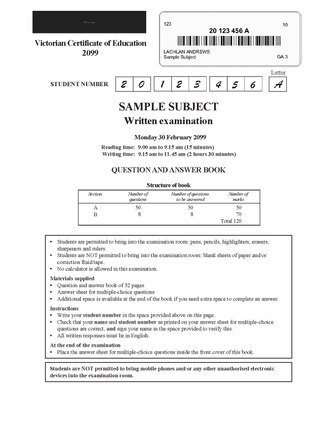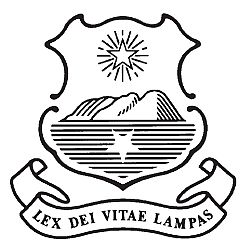
Outcome-based education or outcomes-based education (OBE) is an educational theory that bases each part of an educational system around goals (outcomes). By the end of the educational experience, each student should have achieved the goal. There is no single specified style of teaching or assessment in OBE; instead, classes, opportunities, and assessments should all help students achieve the specified outcomes. The role of the faculty adapts into instructor, trainer, facilitator, and/or mentor based on the outcomes targeted.
Education in Australia encompasses the sectors of early childhood education (preschool) and primary education, followed by secondary education, and finally tertiary education, which includes higher education and vocational education. Regulation and funding of education is primarily the responsibility of the States and territories; however, the Australian Government also plays a funding role.

The Victorian Certificate of Education is one credential available to secondary school students who successfully complete year 11 and 12 in the Australian state of Victoria as well as in some international schools in China, Malaysia, Philippines, Timor-Leste and Vietnam. The VCE is the predominant choice for students wishing to pursue tertiary education. An alternative to VCE is the Victorian Certificate of Applied Learning (VCAL), a vocational based senior secondary school qualification. About 67% of all 19-year-olds in Victoria had completed the VCE in 2020, compared to about 11% of students completing the VCAL. A small number of government secondary schools, and a somewhat larger number of private schools, offer the IB Diploma Programme as an alternative.
The National Curriculum for England was first introduced by the Education Reform Act 1988. At the time of its introduction the legislation applied to both England and Wales. However, education later became a devolved matter for the Welsh government. The National Curriculum is a set of subjects and standards used by primary and secondary schools so children learn the same things. It covers what subjects are taught and the standards children should reach in each subject.

Synthetic phonics, also known as blended phonics or inductive phonics, is a method of teaching English reading which first teaches the letter sounds and then builds up to blending these sounds together to achieve full pronunciation of whole words.
The Key Skills Qualification is a frequently required component of 14-20 education in England, Northern Ireland and Wales. The aim of Key Skills is to encourage learners to develop and demonstrate their skills as well as learn how to select and apply skills in ways that are appropriate to their particular context.

The Victorian Tertiary Admissions Centre (VTAC) is the administrative body that processes tertiary course applications for universities in the state of Victoria, Australia. Incorporated in 1967, it has offices located at South Melbourne, Victoria, Australia. It is a member of the Australasian Conference of Tertiary Admission Centres (ACTAC).
In the state of Victoria, Australia, the Victorian Essential Learning Standards(VELS) is the curriculum framework for Preparatory to Year 10 school levels, which replaced the Curriculum and Standards Framework II (CSF 2) in 2006. Students starting Year 11 normally proceed to complete the Victorian Certificate of Education (VCE), but other education options are available. VELS was superseded by the Australian Curriculum AusVELS in 2013.

Presbyterian Ladies' College, Melbourne (PLC), is an independent, private, Presbyterian, day and boarding school for girls, located in Burwood, an eastern suburb of Melbourne, Victoria, Australia.

Viewbank College is an Australian public secondary school located in the north eastern suburb of Viewbank, in Melbourne, Australia.

The Department of Education is a government department in Victoria, Australia.

The Victorian Curriculum and Assessment Authority (VCAA) is a statutory authority of the Victoria State Government responsible for the provision of curriculum and assessment programs for students in Victoria, Australia. The VCAA is primarily accountable to the Victorian Minister for Education. It is also responsible to the Minister for Training and Skills and the Minister for Families and Children in relation to sections of Part 2.5 of the Education and Training Reform Act 2006.
The General Achievement Test is a test of general knowledge and skills including communication, mathematics, science and technology, the arts, humanities and social sciences in the Australian state of Victoria.
A curriculum framework is an organized plan or set of standards or learning outcomes that defines the content to be learned in terms of clear, definable standards of what the student should know and be able to do.
The Achievement Improvement Monitor (AIM) program was a testing scheme used to monitor the development of literacy and numeracy skills of school students in Victoria, Australia.

Education in Victoria, Australia is supervised by the Department of Education and Training (DET), which is part of the State Government and whose role is to 'provide policy and planning advice for the delivery of education'. It acts as advisor to two state ministers, that for Education and for Children and Early Childhood Development.
Teaching in Victoria, Australia is regulated by the Victorian Institute of Teaching, through the Department of Education and Training (DET), which is part of the State Government. The DEECD is biggest operator of schools in the state, and along with the independent and Catholic school systems have an interest in teaching as the operator of schools and employer of teachers.

Deutsche Schule Melbourne (DSM) is an accredited German School Abroad which opened in 2008. The school offers bilingual education for primary school children up to Year 6 and is in North Fitzroy, a northern suburb of Melbourne, Victoria, Australia.

Doncaster Secondary College is a secondary school located in the Melbourne suburb of Doncaster.
The Victorian Early Years Learning and Development Framework (VEYLDF) is a state-wide, curriculum for early childhood education implemented in Victoria, Australia, for working with children from birth to eight years of age to support literacy, numeracy, health and wellbeing.